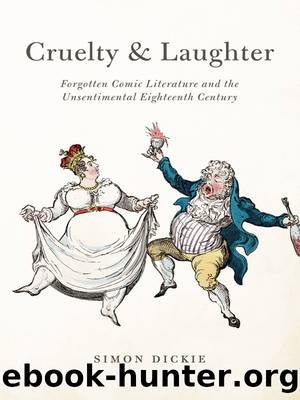Cruelty and Laughter by Simon Dickie;

Author:Simon Dickie;
Language: eng
Format: epub
Publisher: University of Chicago Press
Published: 2011-10-15T00:00:00+00:00
Verily I smell a great deal of Aââbomination and Prophanessâa Smell of Brimstone offendeth my Nostrils, a Puppet-Show is the Devilâs-House, and I will burn it.86
On this matter, at least, Adams is only slightly less stridentâhorror of horrorsâthan Wesley and Whitefield, who were then riding around England fulminating against plays and other diversions. Adams repeats not just the sentiments but the precise idiom of early modern antitheatricality and of Fieldingâs enemies at the Grub-Street Journal.
Indeed, by the standards that Fielding himself set forth in his Champion essays, Adams is far from an ideal clergyman. Consider the early series of questions he puts to Joseph: â[H]ow many Books there were in the New Testament? which were they? how many Chapters they contained? and such likeâ (23). This is standard Sunday school stuff, unimaginative rote learning and nothing to do with the Bibleâs moral teachings. Stranger still, Adamsâs superstitions are repeatedly emphasized. He twice declares his belief in ghosts and apparitions (192â96). âSure the Devil must have taken it from me,â he insists on discovering the loss of his half guinea (254). The confusions of the night at Booby Hall could have resulted only from witchcraft. The suggestion that Mrs. Slipslop might be a witch makes its own wink at the reader, but the parsonâs superstition is prominently repeated. Only sorcery, he persists, could have put him in bed with Fanny: âHe is an infidel who doth not believe in Witchcraft. They as surely exist now as in the Days of Saul. My clothes are bewitched away too, and Fannyâs brought into their placeâ (332â34).
The other notably superstitious figure in Fieldingâs oeuvre is Partridge, who repeatedly talks of ghosts and black magic and trembles in terror at a performance of Hamlet. The pious reading that Adams applauds in the young Joseph includes not just the Bible and The Whole Duty of Man but all the fanciful miracles from Bakerâs Chronicle of the Kings of England (1643, etc.)âobvious rubbish about the devil carrying away the chancel in the middle of a sermon or âhow a Field of Corn ran away down a Hill with all the Trees upon itâ (24). An enormous folio of one thousand pages, Bakerâs Chronicle was a byword for foolish superstition in this culture. Fielding would be openly scornful when he discussed the book in the Covent-Garden Journal. (A still clearer illustration of contemporary opinions appears in Coventryâs Pompey the Little, where the dog hero is thrown out by a pious spinster after accidentally shitting on her copy of Baker.)87 Fielding the former deist was obviously scoffing at such credulities, but by the mid-eighteenth century they had become risible to almost anyone who could pay 6s. for the two volumes of Joseph Andrews.
Download
This site does not store any files on its server. We only index and link to content provided by other sites. Please contact the content providers to delete copyright contents if any and email us, we'll remove relevant links or contents immediately.
Cecilia; Or, Memoirs of an Heiress — Volume 3 by Fanny Burney(31455)
Cecilia; Or, Memoirs of an Heiress — Volume 2 by Fanny Burney(31408)
Dialogue by Robert McKee(4160)
The 101 Dalmatians by Dodie Smith(3299)
Bound by Hatred (The Singham Bloodlines Book 2) by MV Kasi(2951)
Harry Potter and the Cursed Child - Parts One and Two by John Tiffany(2921)
The Art of Dramatic Writing: Its Basis in the Creative Interpretation of Human Motives by Egri Lajos(2857)
The Beautiful Boys: A High School NA Reverse Harem Paranormal Bully Romance (Shadowlight Academy Book 1) by Gow Kailin(2729)
Angels in America by Tony Kushner(2390)
Carrie's War by Nina Bawden(2354)
A Clockwork Orange by Anthony Burgess(2321)
Unlaced by Jaci Burton & Jasmine Haynes & Joey W. Hill & Denise Rossetti(2251)
The Femme Playlist & I Cannot Lie to the Stars That Made Me by Catherine Hernandez(2170)
Drama by John Lithgow(2116)
Open Book by Jessica Simpson(2112)
Outside Woman (BWWM Amish Romance) by Stacy-Deanne(1968)
Terrorist Cop by Mordecai Dzikansky & ROBERT SLATER(1962)
Yerma by Federico García Lorca(1922)
Leo's Desire by Sundari Venkatraman(1813)
